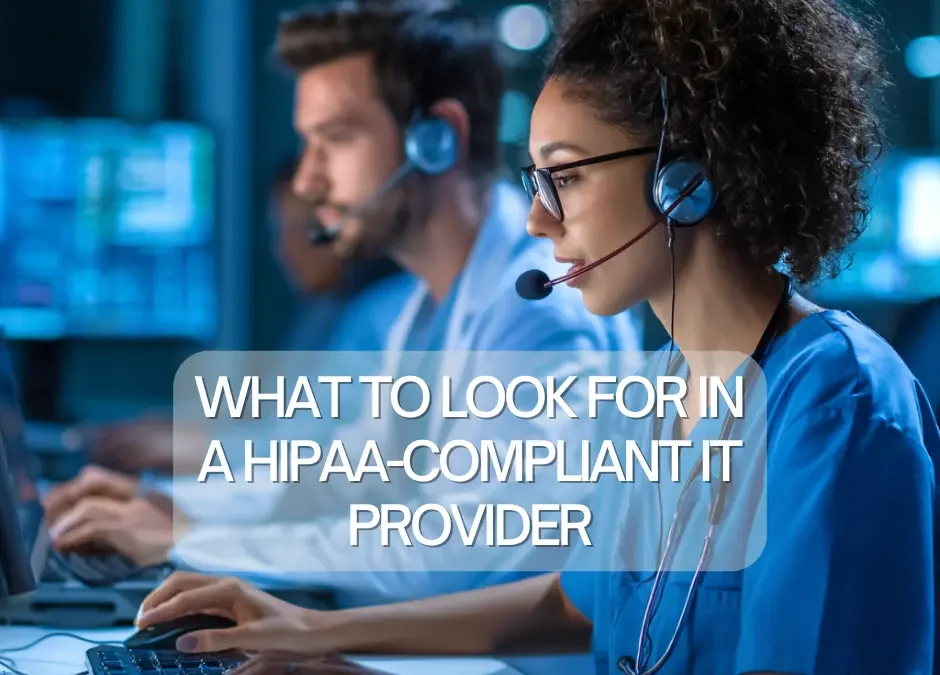Selecting a HIPAA-compliant IT provider is more than a legal requirement—it’s a critical choice that affects security, operations, and patient trust. Whether you run a clinic, manage a hospital IT department, or operate telehealth services, knowing exactly what to look for will help you avoid costly mistakes.
1. How do I know if an IT provider is genuinely HIPAA compliant?
You can tell an IT provider is genuinely HIPAA compliant if they can clearly explain their safeguards, provide a signed BAA, and show proof of compliance audits.
Key signs of a truly compliant provider:
- Signed Business Associate Agreement (BAA) without hesitation.
- Documented HIPAA policies for PHI encryption, access controls, and secure communication.
- Secure handling of high-risk tasks like email migration without PHI exposure.
- Implementation of DMARC setup to block phishing and spoofed emails targeting staff.
Quick Check Table
| Question to Ask | Green Flag | Red Flag |
|---|---|---|
| Can you provide your last HIPAA audit results? | Yes, documented | No, vague answer |
| Do you offer HIPAA compliant IT support for ongoing monitoring? | Yes | Only “on-demand” support |
| Will you sign a BAA? | Immediately | Avoids commitment |
2. Which certifications matter most for a HIPAA-compliant IT provider?
The most important certifications are those that prove robust security and healthcare expertise, such as HITRUST CSF, SOC 2 Type II, and ISO 27001.
Top Certifications to Look For:
- HITRUST CSF – Covers HIPAA and other security frameworks.
- SOC 2 Type II – Confirms controls for data security, confidentiality, and availability.
- ISO/IEC 27001 – International information security management standard.
- CompTIA Security+ – Baseline cybersecurity certification for technical staff.
Why certifications matter for you:
- During email migration, certified providers know how to encrypt PHI in transit.
- With DMARC setup, certified teams can integrate email authentication into secure workflows.
- Certifications often mean faster HIPAA audits, because documentation already aligns with requirements.

3. What security measures should I expect from a HIPAA-focused IT partner?
A HIPAA-focused IT partner should provide multi-layered security, including encryption, MFA, and continuous monitoring.
Core HIPAA Security Measures:
- End-to-end encryption for all PHI.
- Multi-factor authentication (MFA) for all administrative access.
- Intrusion detection and prevention systems.
- Scheduled vulnerability scanning.
Special focus on email security:
- DMARC setup to stop spoofed messages before they hit your inbox.
- Secure email migration protocols that prevent data leaks during platform changes.
Mini Flowchart: HIPAA Email Security Path
Secure Email Policy → DMARC & SPF Records → Encryption → Continuous Monitoring → User Awareness Training
4. Why is healthcare-specific experience important in IT support?
Healthcare-specific experience is important because it ensures the provider understands EHR systems, telehealth security, and PHI workflows.
Healthcare IT knowledge covers:
- Integrating with EHR/EMR systems like Epic, Cerner, or Athenahealth.
- Handling secure medical imaging and lab system connections.
- Managing telehealth platforms in compliance with HIPAA.
Practical benefits of experience:
- Reduced downtime during email migration because they understand healthcare scheduling needs.
- Proactive DMARC setup to protect against spear-phishing campaigns targeting medical staff.
- Awareness of compliance pitfalls, like unsecured fax-to-email workflows.

5. How should a provider communicate and document compliance?
A good provider documents compliance with written policies, updated annually, and shares clear audit records.
Essential Documentation to Request:
- HIPAA security policies and annual review notes.
- Incident response plans and test results.
- Training logs for HIPAA awareness sessions.
- DMARC setup reports showing domain protection status.
- Detailed email migration plans with encryption methods.
6. What kind of support should I expect as my organization grows?
As you grow, expect scalable HIPAA compliant IT support with 24/7 coverage, proactive upgrades, and risk prevention.
Scalable Services Include:
- Round-the-clock monitoring with guaranteed response times.
- Larger email migration projects with zero PHI exposure.
- Expanded DMARC setup policies as your email footprint increases.
- Quarterly compliance reviews to keep pace with regulatory changes.
FAQ: HIPAA-Compliant IT Support, Email Migration, and DMARC Setup
Q1: What is HIPAA compliant IT support?
HIPAA compliant IT support is technical service that protects PHI by following HIPAA’s Privacy, Security, and Breach Notification Rules.
It includes security monitoring, data encryption, staff training, and compliance audits—all designed to meet federal standards and prevent breaches.
Q2: Why is DMARC setup important for healthcare organizations?
DMARC setup helps prevent email spoofing and phishing attacks that could trick staff into revealing PHI or system credentials.
In healthcare, where email is a major attack vector, this is a critical step in HIPAA security strategy.
Q3: How does email migration affect HIPAA compliance?
Email migration can expose PHI if done incorrectly, so providers must use encrypted transfers and restrict access during the process.
Working with a HIPAA-compliant IT provider ensures migrations meet all security and audit requirements.
Q4: Do all IT providers sign a BAA?
No—only providers that handle PHI and understand HIPAA requirements should sign a BAA.
If an IT vendor refuses, they likely aren’t prepared for the legal and technical responsibilities of HIPAA compliance.
Q5: How often should a HIPAA IT provider update security protocols?
They should update them at least annually or whenever regulations change.
Continuous improvement is essential to stay ahead of new cyber threats and maintain compliance.
ITGuys IT Support and Cybersecurity
1738 Wynkoop St. Suite 303 Denver, CO. 80202 – (303) 578-6256
IT Support – Computer Repair – Managed Service Provider – Network Cabling – Web Design


Recent Comments